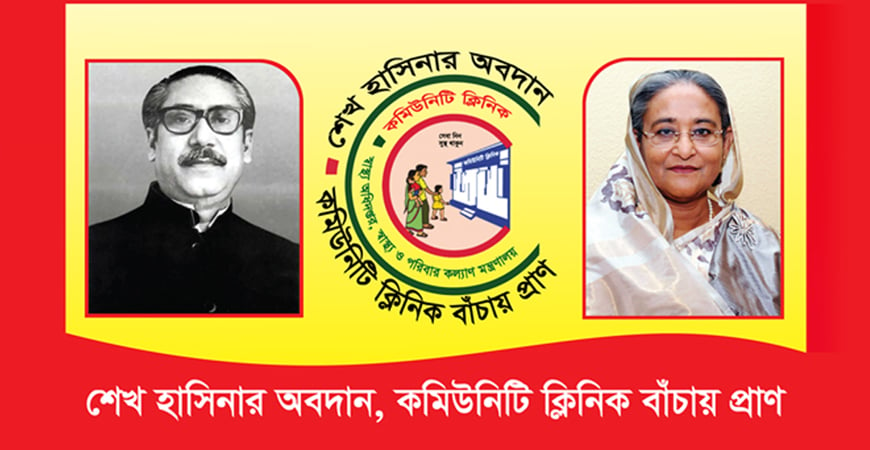
Mahfuza Jasmine
DHAKA, June 30, 2023 (BSS) - Community Clinic, a brainchild programme of Prime Minister Sheikh Hasina, is now recognized worldwide as a unique model of healthcare for marginal people.
The international community, including the World Health Organization (WHO), has demanded international recognition of this model of health care in Bangladesh.
Community Clinic Programme Manager Dr Asif Iqbal told BSS that the community clinic is an initiative planned by Prime Minister Sheikh Hasina.
Prime Minister Sheikh Hasina launched this unique community clinic-based health system in Bangladesh in 1998 with the aim of bringing all the people of Bangladesh under primary healthcare, which has made a revolution in delivering the benefits of government primary healthcare at the doorsteps of the people at grassroots, he said.
In these community clinics, 30 types of free medicines are given to patients, he added.
Dr Asif said that the community clinics were built on the land of the local people with the money of the government and the clinics are run by local people.
That's why awareness has been created among the locals about the services of the community clinic as well as they also play a role in maintaining the quality of the services, he mentioned.
In 2018, the government formulated the Community Clinic Health Assistance Trust Act with the aim of bringing primary healthcare to the doorsteps of the rural people of the country with the cooperation of social organizations, private individuals and institutions, said the programme manager.
He said today this model of providing health services to the rural population through public-private partnership has gained reputation worldwide.
Community clinics also create health awareness and provide health education to rural people, he said, adding that it is also playing an important role for women empowerment.
In view of this, the United Nations unanimously adopted the first-ever resolution on community-based healthcare on its 22nd agenda of the 77th session on May 16, 2023 (Tuesday), he said.
Permanent Representative of Bangladesh to the United Nations Ambassador Muhammad Abdul Muhith introduced the resolution in the General Assembly.
The resolution was co-sponsored by 70 UN member states as part of their strong support for community clinic-based health systems.
On behalf of the Bangladesh Permanent Mission to the United Nations, the resolution was discussed with the member states by Deputy Permanent Representative Md. Manowar Hossain.
The historic resolution, entitled, "Community-based primary healthcare: a participatory and inclusive approach to universal health coverage," acknowledged the important role community clinics play in promoting primary health care, women's empowerment, community engagement and mobilization towards achieving universal access to health.
The resolution, in recognition of Prime Minister Sheikh Hasina's stellar contribution to establishing model community clinics in Bangladesh, highlighted 'the Sheikh Hasina Initiative' as an exemplary innovative model of public-private partnership.
It reflects Bangladesh's commitment to improve health and well-being of its citizens and to contributing to global health equity.
Community Clinic is one of the ten special initiatives of Prime Minister Sheikh Hasina. Every person from the marginalized community is getting quality free healthcare. As a result, access to healthcare for rural communities has been created while infant and maternal mortality rates have decreased.
Along with health services, the establishment of child daycare centers for the children of working women has paved the way for the economic empowerment of marginalized women.
Even when the whole world became disoriented to deal with the Covid-19 pandemic, the community clinics of Bangladesh had played an incredible role in healthcare. This community clinic made the Covid-19 vaccination programme a success in remote areas.
One community clinic has been established for 6,000 people. These clinics provide free healthcare as well as 27 to 32 types of medicines to health recipients.
Dr Asif said a total of 14, 253 community clinics have been established across the country so far. Of these, 14,200 are providing services, he said, adding that all preparations are going on to enable the remaining 53 clinics for providing services.
According to the government's implementation plan, the 'Community Clinic Health Assistance Trust' will be fully prepared by 2030 to run the community clinics and later the community clinics will be run under this trust, he said.
The trust aims to ensure people's participation in integrated primary healthcare services for rural people, receive necessary social support for the purpose of providing integrated primary healthcare services, collect resources or donations from individuals and institutions and ensure its proper use as well as establish an effective referral system to union sub-health centers, upazila health complexes, district level hospitals, specialized hospitals and medical colleges and hospitals with community clinics.